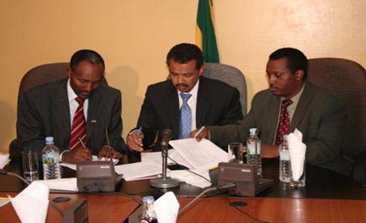3.2 Memorandum of Understanding
Merely understanding and wanting to apply a sector-wide approach is not enough. To put wishes into action there needs to be a formal and legally binding agreement between the stakeholder organisations. (A stakeholder can be defined as an individual, organisation or institution with an interest in an enterprise, project or programme.) As a means to materialise the sector-wide approach for WASH, the stakeholder ministries had to agree on how to share roles and responsibilities. This led to the development of a Memorandum of Understanding. A Memorandum of Understanding, commonly abbreviated to MoU, is a formal working document that outlines the procedures and roles, responsibilities and accountability of the organisations that sign it towards meeting a specified objective.
Do you recall from Study Session 1, which ministries were involved in developing the OWNP?
The government ministries that are stakeholders in the OWNP are: the Ministry of Water, Irrigation and Energy; the Ministry of Health; the Ministry of Education and the Ministry of Finance and Economic Development. (You may also have remembered the Ministry of Water Resources from Study Session 2. This is the former name of the Ministry of Water and Energy, which was later renamed the Ministry of Water, Irrigation and Energy, and, in 2015, became the Ministry of Water, Irrigation and Electricity.)
Figure 3.1 shows the Memorandum of Understanding being signed by representatives of the Ministries of Water, Health, and Education in 2006.

Following the signing in 2006, it was realised that the MoU had some gaps that were hampering the WASH promotion efforts. The main gap identified was the fact that the Ministry of Finance and Economic Development (MoFED) was not included as a signatory. All WASH projects and programmes needed to mobilise and manage funds, therefore it was essential to involve MoFED.
In addition to this, the original MoU did not include any mention of accountability. Accountability is an obligation or willingness to accept responsibility. Each of the WASH signatory ministries needed to be accountable for their activities to ensure they were fully addressing their respective roles and responsibilities as detailed in the MoU. Therefore, after about six years, in November 2012, a revised MoU was signed by four ministries: the Ministry of Water and Energy (MoWE); the Ministry of Health (MoH); the Ministry of Education (MoE), all of whom had all signed the first MoU, and the Ministry of Finance and Economic Development (MoFED).
The two main features of the revised (second) MoU were:
- MoFED, which has an essential role to play in managing WASH funds, became the fourth signatory.
- It has a dedicated section on accountability, which is crucial to check on the fulfilment of the roles and responsibilities of each of the signatory ministries.
The MoU signed by the respective ministers has been further cascaded down to all Regional States where it has been signed by heads of the respective regional bureaus, i.e., Health, Education, Water, Irrigation and Energy, and Finance and Economic Development.
The National WASH MoU that was revised and signed in November 2012 was an essential preliminary step in the development of the OWNP itself. The MoU has eight sections, which can be summarised as follows:
Introduction
This provides overall background information on the national WASH endeavour. Commitments of the Ethiopian government to achieve WASH-related targets set at both national and international level under the Millennium Development Goals are highlighted. The Introduction sets out the government’s intention to uplift the country’s economy to the level of middle-income countries by the year 2025. Associated with this aim is the need to work hard towards improving social services such as WASH. Progress and impact in WASH service delivery is described as hampered by the fragmented and uncoordinated efforts of different ministries.
The Introduction section concludes by underlining the purpose of the revised MoU: ‘to ensure the effective achievement of WASH targets set in the Growth and Transformation Plan’ (MoWE et al., 2012).
Rationale for the revision of the former MoU
A number of reasons for revising the 2006 MoU are mentioned. For example, new developments at national and international levels, reform of organisational structures and a change in the system for channelling funds by the major donors that had enhanced the role of MoFED. Also mentioned are the Urban Health Extension Programme and the growing need for the private sector to involve itself in WASH provision.
Rationale for integration of water, sanitation and hygiene
Under this section the benefits of providing WASH services as a package are described. This section also clearly indicates the shift from a project-based to a sector-wide approach, which paved the way for the development of the OWNP later in 2013.
Major areas of co-operation
Among others, the following areas of co-operation are listed:
- consideration of the principle of ‘one plan, one budget, one report’ in order to jointly prepare WASH ‘plans of action’
- joint monitoring and evaluation of WASH programme implementation
- to establish strong links with all WASH partners, including civil society organisations (CSOs) and the private sector.
Administrative and technical arrangements
This section outlines the technical and administrative arrangements with specified roles and responsibilities to ensure effective and efficient WASH programme management.
Undertakings by each WASH sector ministry
This section lists expected tasks of the four signatory ministries, geared towards the national WASH programme implementation process.
Specific responsibilities of sector ministries in planning and implementing the WASH programme
The particular responsibilities assigned to each ministry are exhaustively listed under this section. It also includes the responsibilities of major non-governmental WASH partners and financing institutions.
Accountability
The last but most important part of the MoU, missed in the first MoU, contains the specific areas of accountability shared amongst signatory ministries.
3.1 Sector-wide approach
